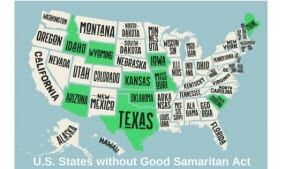In 2016, over 64,000 Americans lost their lives due to a drug overdose. The Centers for Disease Control and Prevention (CDC) reported that the highest increase was among synthetic opioids, with over 20,000 deaths  attributed to fentanyl and fentanyl analogs.1
attributed to fentanyl and fentanyl analogs.1
Emergency administration of naloxone, an overdose-reversing drug, saved thousands of lives and prevented the number of deaths from being tragically higher. Good intentions, such as the actions of Walgreens, are making naloxone more available and accessible. Good intention is the spirit behind the Good Samaritan Act, a law that provides legal protection to anyone offering help to someone experiencing a medical emergency.
Calling 911 shouldn’t be a crime when trying to help someone overdosing on drugs. Every state in the U.S. has some version of the Good Samaritan Act. The act was created to protect physicians, and other health care provides, treating patients.
The law states that the responder must have the victim’s consent. However, consent is implied in certain conditions, such as if the person is unconscious, intoxicated, overdosing or deemed mentally unfit to make rational decisions.
Drug Overdose Immunity Laws
40 states, plus the District of Columbia, have a special provision in place that is sometimes called the 911 drug overdose immunity law.2 The 911 Good Samaritan Act is a way to encourage people to get help for someone during a drug overdose.
Chapter 893, Drug Abuse Prevention and Control, of the Florida Statues says, “A person acting in good faith who seeks medical assistance for an individual experiencing a drug-related overdose may not be charged, prosecuted, or penalized pursuant to this chapter for possession of a controlled substance if the evidence for possession of a controlled substance was obtained as a result of the person’s seeking medical assistance.”3
The danger in Arizona, and other states that don’t have an overdose law in place, is the possibility of putting people’s lives at risk. Here is a list of the states that don’t have a 911 provision:
- Arizona
- Kansas
- Idaho
- Iowa
- Maine
- Missouri*
- Oklahoma
- South Carolina
- Texas
- Wyoming
*Missouri just passed Senate Bill 501, which provides a provision for a 911 Good Samaritan Law as pertains to drug or alcohol overdoses.4 The new medical emergency amnesty law just went into effect August, 2017.5
Amnesty Isn’t Always Guaranteed
The Good Samaritan Act provides protection to both the caller and the victim, however this protection does not apply to the person that sold or provided the drugs. So, in the event the victim dies, if the person that tried to get them help also supplied the drugs, they could be arrested.
Tim Ryan, Founder of A Man in Recovery and National Outreach Director for Transformations Treatment Center, spotlights this significant loop-hole in the law: “The issue is that most states have a Good Samaritan Law in place, but what happens if the person overdosing dies? If a person calls 911 and the first responders transport the individual to a hospital but the overdosing person doesn’t make it, then the caller can be charged with drug-induced homicide. That makes good Samaritans retreat from helping save a life.”
In May of 2013, New Jersey Governor Chris Christie signed the Drug Overdose Protection Act into law. The act encourages people to seek immediate medical assistance in the event they witness someone experiencing a drug overdose without fear of prosecution.6
Michael DeLeon, founder of Steered Straight Inc. and the National Recovery Advocate for Transformations Treatment Center says, “There needs to be an expansion and increased community awareness through better educational programs on the Overdose Protection Act. This law protects users from prosecution if they call 911 to save the life of another user. Instituting a Federal Good Samaritan Law, so that every state protects those that contact 911 to save the life of an overdose victim, would be the most expedient way to accomplish this goal.”
Drug Courts Instead of Incarceration
Lives can be lost if someone is afraid they will be arrested if they seek help during a drug overdose. In the event someone who thought they were protected under the Good Samaritan Law is arrested for possession of a controlled substance, enrollment in a drug treatment court program could prove to be a better solution.
In an earlier blog post Transformations Treatment Center discussed alternative incarceration programs. The article, Illicit Drug Use in Illinois: Drug Courts as an Alternative to Conviction, mentions the benefits of problem-solving courts as a viable alternative to jail time.
Resources
- National Institute on Drug Abuse. Overdose Death Rates. Revised September 2017. https://www.drugabuse.gov/related-topics/trends-statistics/overdose-death-rates
- National Conference of State Legislatures. Drug Overdose Immunity and Good Samaritan Laws. http://www.ncsl.org/research/civil-and-criminal-justice/drug-overdose-immunity-good-samaritan-laws.aspx
- Online Sunshine. The 2017 Florida Statutes. Chapter 893 Drug Prevention and Control. http://www.leg.state.fl.us/Statutes/index.cfm?App_mode=Display_Statute&URL=0800-0899/0893/Sections/0893.21.html
- 5 On Your Side. Missouri Passes Good Samaritan Law. http://www.ksdk.com/article/news/local/missouri-passes-good-samaritan-law/63-439650366
- Good Samaritan Law Aims to Decrease Overdose Deaths in Missouri. https://www.columbiamissourian.com/news/state_news/good-samaritan-law-aims-to-decrease-overdose-deaths-in-missouri/article_feafabac-9d4a-11e7-9171-d3e8a9d1e574.html
- State of New Jersey. Department of Human Services. Christie Administration Promotes ‘Good Samaritan Law’. http://www.state.nj.us/humanservices/news/press/2013/approved/20130709.html




